We need to talk about sex, says Emma Thompson, who bares all in her new film, Good Luck to You, Leo Grande
Emma Thompson, 63, opens up about sex scenes with a man more than 30 years her junior and the harm caused by depictions of conventional on-screen romance.
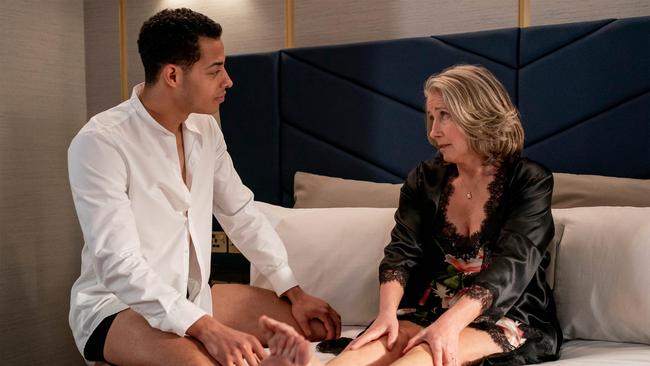
In the press notes accompanying her latest film, Good Luck to You, Leo Grande, Emma Thompson describes herself as “a war horse that’s done a lot of stuff’’. Which just goes to show, nobody does self-deprecating understatement quite like the Brits.
With an Emmy, three BAFTAs and two Academy Awards under her belt, Thompson – who famously kept her gold-plated Oscar statuettes in her downstairs loo – is rightly celebrated as a gifted screenplay writer and fearless actor who has played everything from Shakespearean heroines to a character based on Hillary Clinton to a bulbous-nosed, snaggle-toothed Nanny with magical powers.
Yet the 63-year-old admits she felt “initial discomfort” over the sex scenes she had signed up to play in Good Luck to You, Leo Grande, which is released in Australia on August 18. In this wryly comic two-hander directed by Australia’s Sophie Hyde, Thompson plays 60-ish widow Nancy Stokes, a retired religion teacher who has never had an orgasm. Nancy reckons “there are nuns out there with more sexual experience than I have” so, despite her misgivings, she hires a young, handsome sex worker to expand her horizons.
Nancy is probably the most sexually exposing role Thompson has played, and the British actor – who was made a Dame in 2018 – notes that we rarely see ordinary, older women in intimate scenes with younger men on screen, apart from “all that sort of cougar stuff, you know, just vomit-inducing crap”.
The Cruella, Love Actually and Howards End star says that Hyde’s film is radical in its depiction of a “deep and unromantic intimacy I’d never seen before” between a mature woman who senses she has missed out on something vital and a young man who, for a price, is keen to help.
The actor argues that Hyde’s film is also radical in its repudiation of conventional romance, which she describes as “a myth that has caused and continues to cause tremendous problems in people’s lives because so much of it is utterly delusional”. This is one of many declarations Thompson will make during our phone interview that, strangely enough, can seem both sweeping and nuanced.
Thompson’s Nancy seems propelled by nervous energy alone as she arrives at a nondescript hotel room to meet her hired lover, the eponymous Leo Grande, armed with a tick-box list of sexual acts – including “a 69, if that’s what it’s still called” – she wants to try. The silkily charming Leo, played by 30-year-old Peaky Blinders star Daryl McCormack, reassures her she is not a pervert and that he enjoys his work.
He also tells Nancy, who harbours a sense of shame about her body, that his oldest client was 82. “Okay, I feel better now,’’ Thompson quips on screen, landing the joke with expert timing.
The British actor says her character is “absolutely terrified by the step that she’s taken and I think that’s where all the comedy comes from”. To resolve her own fears about the sex scenes she would inevitably perform, she, McCormack and Hyde came up with a novel plan – they would do a nude rehearsal before the cameras started rolling.
Thompson tells Review: “We closed our rehearsal room and the three of us just disrobed so that we could get over the sense of it (filmed sex scenes) being quite an unnatural thing to do. We did that in order to overcome that initial discomfort and we talked about our bodies and what bits of them we liked; how we felt about them, how we inhabited them.”
Did this help with shooting the movie’s intimate scenes, which were also performed on closed sets? “It did make us all feel a little bit more relaxed, yeah,” she replies in that familiar, beautifully-modulated voice, her accent verging on posh while accommodating some fashionably dropped Ts.
Hyde reveals that joining her two actors for a nude rehearsal “certainly wasn’t part of my initial plan” – and that it followed a challenge from Thompson. Says the Adelaide-based director: “I knew Emma and Daryl both wanted to get naked before they were on set because that’s the weird thing about films – ‘Here we are! Let’s just get naked for the first time and let’s go’.’’ Hyde recalls that Thompson jokingly said to her, “You’ll get naked too”. The director initially responded: “Ha ha ha, no way!’’ Thompson then said, “Of course not, you don’t need to.” Hyde brooded about how she was “asking them to reveal something (because) I’d like to strip away some of the shame that we carry around our own bodies”.
She feels she “truly inhabited that decision” by taking part in the nude rehearsal.
Apart from baring her body, Thompson wasn’t daunted by the prospect of playing a 60-something woman who goes on a mission to find erotic satisfaction and ends up having a psychological as well as a physical awakening.
“I don’t think it was daunting because the story (penned by British comedian Katy Brand) was so beautifully rendered,” she says.
During her long marriage, Nancy had had perfunctory sex with her husband and faked orgasm, yet Thompson doesn’t necessarily see her as sexually repressed.
“It’s just that she’s never really had pleasure and I don’t know whether that’s repression or whether life never offered the opportunity,’’ she says.
For all society’s rhetoric about female empowerment, she feels women’s sexual pleasure is still considered unimportant: “For most women, nobody asks, nobody is interested in whether the women have sexual pleasure or not, it’s not at the top of any agenda, as far as I know, in any culture,” she argues.
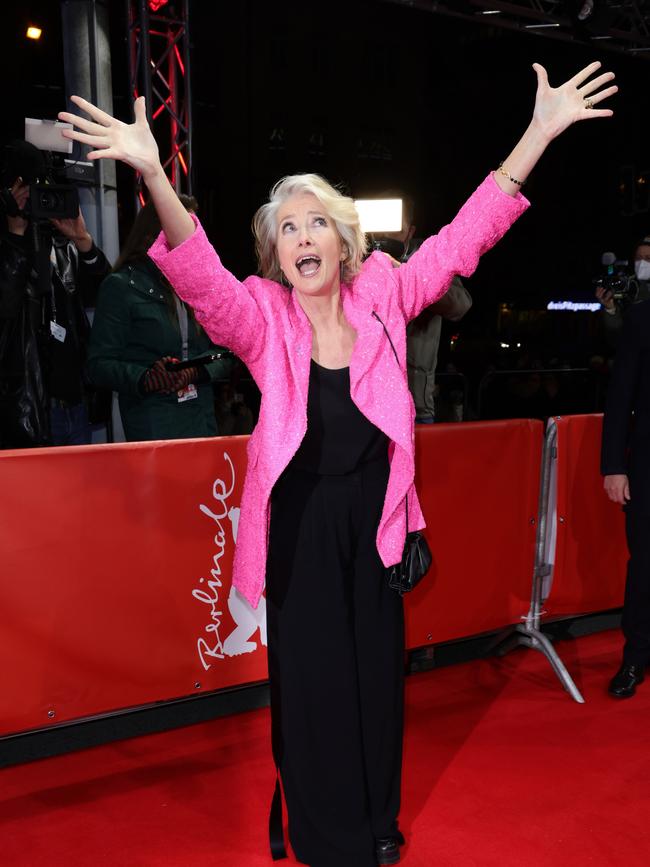
She says many women are dishonest with their partners about sex in order to spare their feelings. “There’s a lot of performance involved in women’s sexual responses to their partners, particularly in heterosexual relationships. We don’t want our partners to feel hurt or as if we might be disappointed or not enjoying it, so we’re encouraged to be a little bit dishonest perhaps about how we’re feeling?” Here, her voice rises, as if she is posing a question.
Thompson has married twice. She and her first husband, Irish actor-director Kenneth Branagh, were, for a time, the young glamour couple of British cinema. They divorced in 1995, amid a blizzard of headlines. Eight years later, she married her current husband, actor Greg Wise, who was her Sense and Sensibility co-star. The couple have two adult children; daughter Gaia is 22, while their informally adopted son, Tindy, was a trafficked child soldier in Rwanda who now works helping other refugees in the UK.
We may live in a sex-saturated era (think Tinder, online porn and every second art house film ever made), but Thompson argues that, like Nancy, men and women don’t really know how to talk about sexual pleasure. She maintains that talking openly and honestly about our sexual needs is still taboo. “I don’t think society takes sex seriously in general. I don’t think that we respect sex, because it’s cultural isn’t it? We’re embarrassed by it, we think it’s a little bit perhaps dirty or not allowed; it’s a little taboo, we don’t discuss it.
“ … We would all be a great deal happier and healthier – and indeed there would be a lot less sexual violence – if we paid more attention to how we gain pleasure and how we experience it, how we talk about it, because we’re really quite puerile about it. We’re very serious about other pleasures – physical pleasures like eating and drinking – we’re almost insanely obsessed with that, but we don’t seem to talk about or share anything to do with sexual pleasure and I do think it’s a mistake.”
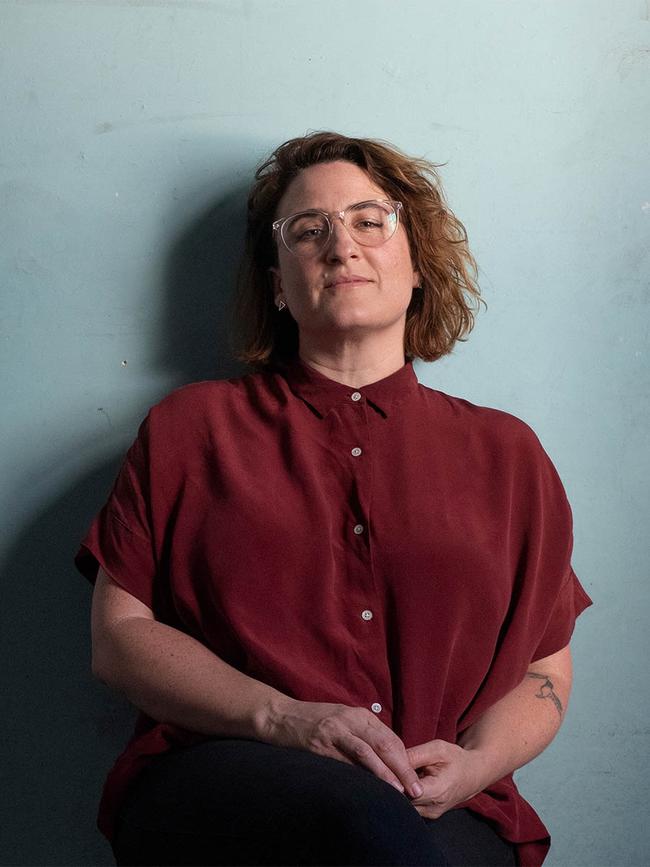
When Hyde, whose critically-admired feature film Animals and television miniseries The Hunting also dealt with complex aspects of sexuality, was offered Leo Grande, Thompson was already attached to the movie. For the Australian director, the chance to work with the superstar – “she’s brilliant and you’d want to do anything with her” – combined with the “concept of a woman wanting to have good sex for the first time” were “thrilling” and “irresistible”.
“It’s amazing to work with someone who is at the top of their craft,” she says. “Emma knew and understood the role of Nancy really, really well. She found in her a kind of familiarity in what she knows … Emma has an amazing ability to switch between comedy and drama and we can see her thinking in a role; she’s so exquisite to watch.”
Thompson says she was drawn to the role of Nancy because she is so relatable. “So many of her beliefs are the opposite of woke which I love, because that’s sort of 90 per cent of the population,” she says in the film’s press notes. “It’s not uncommon – her attitudes, her prejudices, her biases. She is just a wonderfully normal person.”
Nancy gets lucky with Leo – McCormack’s sex worker dresses like he has just come from a GQ cover shoot and is well-spoken, patient and a considerate lover. The Spectator critic Deborah Ross wrote that McCormack is “insanely charismatic” and joked: “I’ll definitely have what she’s having.” However, when Nancy crosses a line, we learn that Leo is carrying emotional baggage of his own, despite marketing himself as a fantasy.
Reflecting her star power, Thompson met McCormack, who is Irish, before he was cast and gave him the thumbs up. “The thing that really persuaded me was nothing to do with his physicality,” she insists. “It was to do with the fact that he was so incredibly thoughtful and he really seemed to understand the character so well … A lot of aspects of Leo – his compassion, his humanity, his curiosity – were very much shared by Daryl, who’s a very unusual young person and a fantastic actor. We couldn’t have done this if we hadn’t trusted each other completely.”
The film pushes the message that paid sex work should be legal, safe and accessible. Thompson says it is a “really interesting and very complex area of discussion … Of course you’re going to get much, much more information and less violence if it’s legalised and made safe.” But she adds, “We’re not making a general statement about sex work … This is a story about two individuals, and that’s the fun of it. I mean, if it was some kind of pamphlet about sex work then we wouldn’t have a story.”
Hyde interviewed “a wide range of sex workers” to research the film and engaged some as consultants, including in the editing suite. “It’s really important that someone with experience is monitoring and seeing what’s there,” says the director.
Thompson has high praise for Hyde’s approach. “Sophie was extraordinary with us,’’ she says. “Sophie not only knew exactly what she wanted from us – which is very important because it’s not always the case with directors – but she also knew what we needed emotionally to bolster us.”
This week, Thompson is visiting Sydney, Melbourne and Adelaide in what will be her third visit to Australia.
“I’m very excited,” she says. “I don’t normally travel long, long distances to sell movies.’’ But “after all of us having been locked away from one another for so long (due to Covid), and because I really wanted to visit with Sophie … I felt it was a journey that really needed to happen.”
In another Australian connection, she played the cantankerous, Queensland-born author PL Travers in the 2013 Hollywood film, Saving Mr Banks, opposite Tom Hanks who played Walt Disney. This film explored Disney’s fraught negotiations with the Mary Poppins author as he sought to turn her bestselling children’s books into the screen musical starring Julie Andrews.
Thompson was nominated for a best actress Oscar for this performance and says it was “a great role, again a role written for me by a younger woman”. She has previously joked that “the dancing penguins were what tipped her (Travers) over the edge” as the talks with Disney and his creators became increasingly fractious.
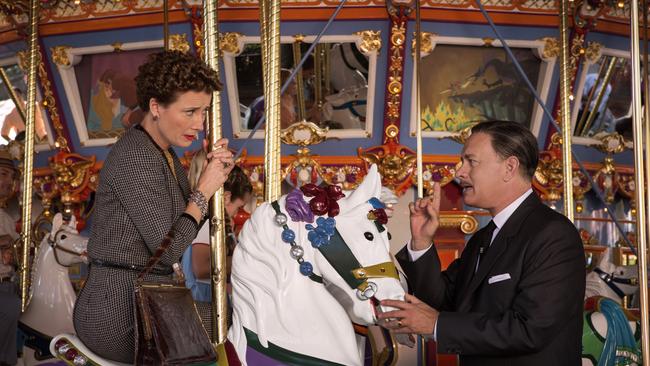
In 2021, she made three films including Leo Grande. I ask whether this suggests the era of older women being denied screen roles is passing, but she firmly rejects this notion.
“I would say that is romanticising. I feel like that it just happened to be by chance that I worked. Generally speaking, I think that women are getting more roles but I don’t think that older women are getting more roles.’’ In fact, she says screen industry ageism “is still very, very severe, and it’s severe across the board. I think it’s severe in television and in presenting. I think it’s still very dire.”
In December, a new film version of Matilda the Musical will be released, in which she plays Agatha Trunchbull, the terrifying principal of Crunchem Hall primary school. Trunchbull is a former Olympic hammer thrower who is fond of hurling little girls across school grounds by their pigtails. Soon after we speak, the film’s trailer is released, and Thompson is almost unrecognisable. As Trunchbull she wears a fat suit, has a shelf for a bosom and a permanent scowl. She looks more like a Nazi prison guard than an educator, and Thompson tells me this character “truly is psychotic”.
A minor social media storm flared, with complaints Thompson’s casting as the cruel headmistress in a fat suit deprived plus-sized actors of the role. Many social media users pushed back, pointing out that Trunchbull was conceived by author Roald Dahl not as an obese woman but as an ex-Olympian javelin and hammer thrower – a “human tank”. Thompson has yet to respond to the controversy but told Review she was hoping to see Australia’s Tim Minchin – whose songs are in the film remake and who created the songs and lyrics for the hit stage musical Matilda – during her visit here. She regards him as “an absolute genius”.
She too, has had a flourishing writing career. She is the only artist to have won Oscars for acting (Howards End) and screenwriting (Sense and Sensibility) and she has just written the stage musical version of another popular children’s character she played on the big screen – Nanny McPhee, the governess with the snaggle-tooth and prosthetic nose who arrives at widower Colin Firth’s lawless household and uses magic to restore order.
She has been writing this musical for five years and expects it to premiere in the UK in late 2023. “I’m going to be working in the theatre for the next year and a half, and I’m so excited about that,” she says.
In 2023, she will be lighting up the big screen again in cross-cultural rom-com What’s Love Got To Do With It? She will play the mother of a documentary maker (Lily James) who, tired of swiping right, becomes intrigued by the arranged marriages she is filming. It’s directed by Shekhar Kapur (Elizabeth) and the script is by Jemima Khan, ex-wife of former Pakistani leader Imran Khan. “It’s a largely Asian cast which is very refreshing,” says Thompson. “They were all great. I had a fantastic, funny time doing that.”
From arranged marriages to paid sex is quite the cinematic trajectory. Leo Grande has already been released in the US and UK and boasts an impressive 94 per cent “certified fresh” critics’ score on Rotten Tomatoes. The international media have made much of a crucial scene in which Thompson’s Nancy drops her robe and takes a frank, accepting look at her nude body.
The actor recently admitted to The Times of London she is not at ease with her body in the same way: “I can’t do it. When I’m looking in the mirror, I’m always trying to make myself look ‘better’, turning this way or that, checking out my a***, pulling something in.”
At a Berlin press conference in February, she said that looking at her unclothed body without self-judgment for the film’s nude scene was the “hardest thing I’ve had to do (as an actor)”. She stood up in her pink glitter blazer and urged women at the presser to do the same.
She is clearly concerned, however, that the focus on her nude scene is a distraction from the fact that Nancy undergoes a psychological as well as physical change through her connection with Leo. “Even though that moment is terribly important, it’s earned. It is at the end of a long, long conversation and a long journey where two really fascinating people – characters I’ve never seen before on screen – unlock things inside themselves and the other,” she says.
Good Luck to You, Leo Grande is released on August 18.


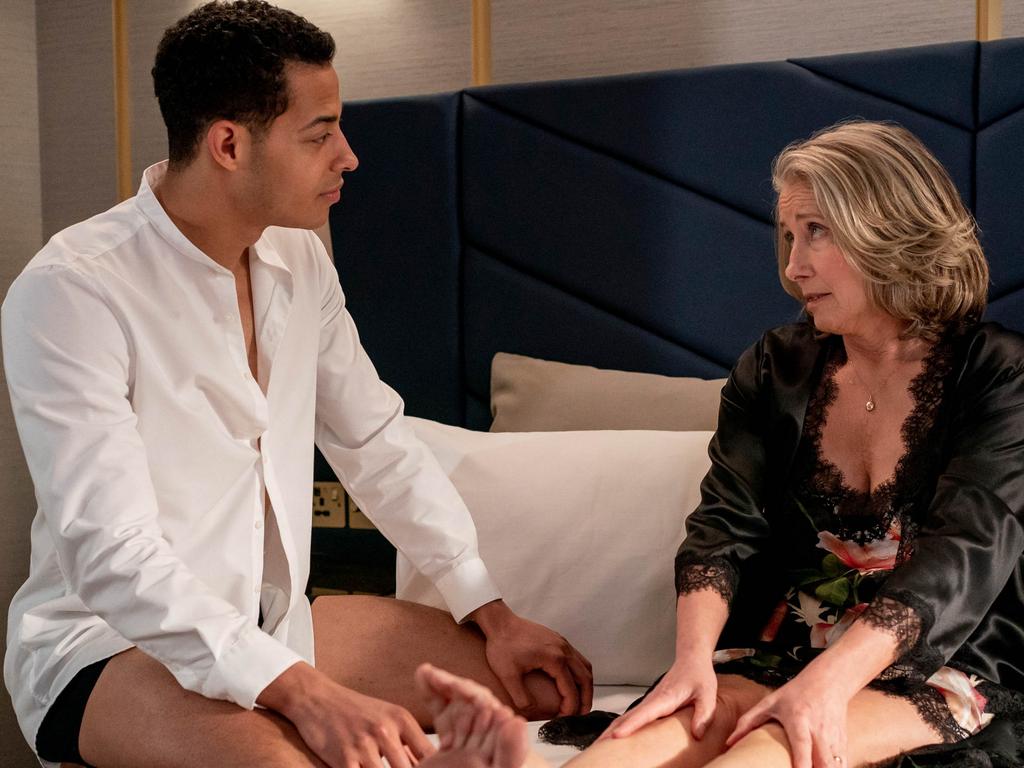



To join the conversation, please log in. Don't have an account? Register
Join the conversation, you are commenting as Logout